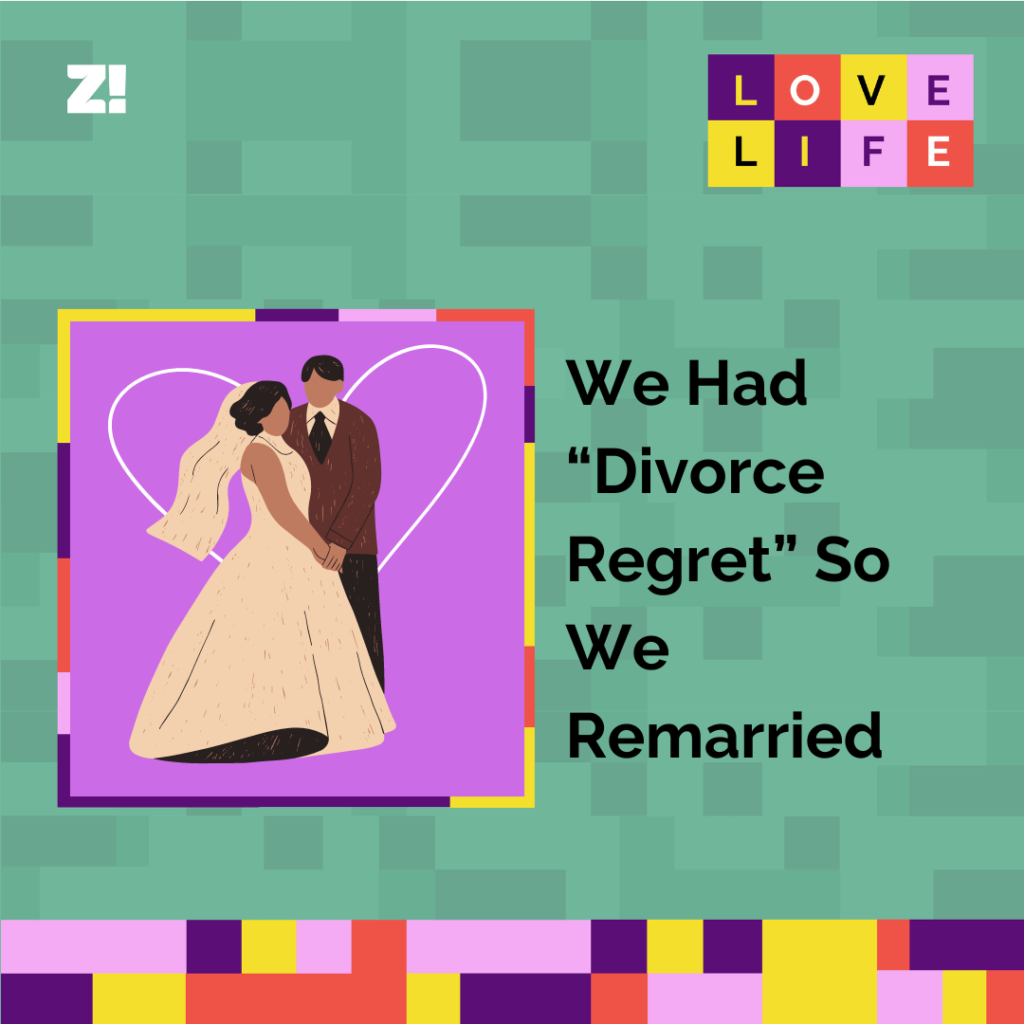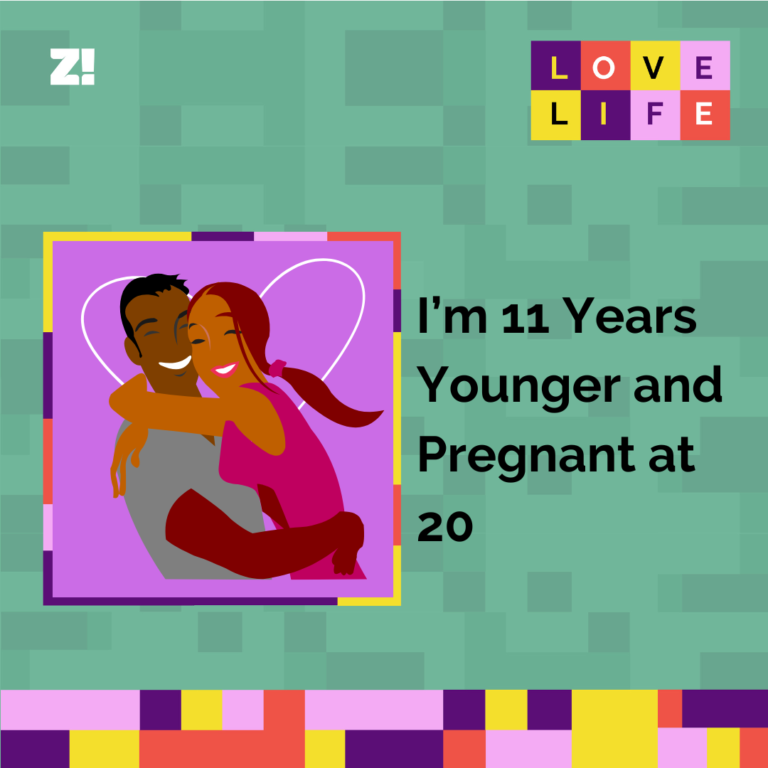Love Life is a Zikoko weekly series about love, relationships, situationships, entanglements and everything in between.

What’s your earliest memory of each other?
Shola: I saw her for the first time at a friend’s wedding in 1993.
She was wearing a bright yellow lace iro and buba, looking like the sun itself. She was much younger—just 18 or 19—but something about her energy drew me in. I didn’t talk to her at first; I wasn’t one to approach women like that, but I kept watching her from across the hall.
Eva: Yes, I was young—barely 18—and honestly, I wasn’t looking for anything serious. I’d just started university, so I was focused on my studies. When I met Shola, I didn’t see him as husband material. I thought he was too serious.
When did you actually meet?
Shola: A few weeks later, I saw her at another gathering and made my move. I was in my prime, already established in my career, so I knew what I wanted, and I could tell she’d make a good wife.
Eva: There was something about him that felt stable. He wasn’t like the boys I knew who were still figuring themselves out. Shola had his life together, and that was… attractive in a way I didn’t fully understand then. My mum always said I was too naive, too easily swept up by men’s charms, but I just thought I could make it work.
And did you make it work?
Shola: Well, we did make it work… at first. I didn’t even notice the age gap back then. I just thought she was the kind of woman who could grow into a role, into a marriage, and support me like my mother supported my father. Isn’t that what most of us were looking for back then?
Eva: But I didn’t know myself yet. That’s what people don’t talk about. I was still becoming “Eva.” At the time, I thought I was mature enough to handle the weight of being a wife, but looking back, I had no idea what I was getting into.
Did you get married soon after meeting?
Shola: Back in the ’90s, relationships weren’t as complicated as they are now. There wasn’t all this back and forth with “talking stages” and whatnot. Once I met Eva and knew she was the one, I made my intentions clear. But we didn’t rush; we didn’t marry until 1996.
What did you do for three years?
Shola: We… courted, you could say. I wasn’t one for long, drawn-out relationships, but I respected that she was still young and in school. I gave her the space to finish her studies, but I also wanted her to know that marriage was the end goal. There was no playing around.
Eva: Courting is a generous word for what we were doing!
You have to understand, I was 18 when we started. I had no idea what I was doing, and honestly, it wasn’t some grand romantic love story in the beginning.
What was it like then?
Shola: I remember the first time I took her to meet my parents in the first year. My mother—God rest her soul—immediately liked her. She said Eva had a quiet strength about her, and she looked like someone who could keep a home. You know how our mothers are.
Eva: Shola was serious, yes, but I was still caught up in the excitement of university and hanging out with my friends. I liked him, and I thought, “Okay, maybe this could be something.” But he was traditional. I remember when he told me outright, “I’m not dating for fun. I’m with you to marry.” And I wasn’t sure how to respond to that.
Shola: You were playing hard to get, Eva.
Eva: I wasn’t playing. I was genuinely unsure.
In what ways were you unsure?
Eva: Like I said earlier, I didn’t know myself. I didn’t really understand what it meant to be a wife. I was barely 21 when we got married; I was still figuring out who I was. Shola had this clear idea of what a wife should be—supportive, nurturing, someone who could focus on the home while he focused on his career. And I tried to fit into that, but I was still a girl growing into a woman. I didn’t fully realise it until I hit my 30s and started resenting how much I’d put aside for our marriage.
What did people around you say at the time?
Eva: My friends thought I was crazy for even considering marriage so young. There were times when I felt like I needed to slow things down, but in our culture, especially then, you didn’t just casually date for years. I think I was pressured, not by Shola necessarily, but by society, my family, even myself. I thought marriage would bring me stability.
Shola: My friends were a little sceptical about the age gap too, but no one really said much. Back then, it wasn’t unusual for a man my age to marry a younger woman.
Tell me more about this courting/dating period
Eva: It was a mix of spending time with each other’s families, and—if I’m being honest—me struggling to balance my school life and the subtle, growing expectation of marriage.
Shola: I knew I was already set in my career and life, but I gave her time to finish school. Looking back, maybe I should’ve given even more space.
Eva: I remember people always asking me when the wedding would be, even before I’d finished my final exams. It was a lot of pressure for a young woman. But I also convinced myself that I could balance both—marriage and my future. That was… naive.
Yeah, he was set. But I wasn’t.
When did you realise that you weren’t in fact “set”?
Eva: I think it really hit me around my early 30s, maybe ten or 11 years into the marriage.
That’s when everything I’d pushed down—my dreams, the version of myself I thought I’d become—just started bubbling up. You know how, in your 20s, you feel like you have all the time in the world? I’d been so focused on being a “good wife,” raising the kids, managing the household, and supporting Shola that I didn’t stop to think about what I wanted for myself.
Shola: I didn’t know she felt that way at the time. I thought everything was fine.
Why?
Shola: It just didn’t add up to me. We never talked about it either.
Eva: That’s the thing. We were living in different worlds. You were doing well, providing for the family, and from the outside, everything looked perfect. But inside, I was drifting.
Weren’t you doing things too, Eva?
Eva: I only worked for a year then the kids came back-to-back, so it made sense to leave work. Shola could afford to take care of us on his salary alone. But I soon started to feel like I didn’t get the chance to know myself outside of marriage and parenting. I was a wife, a mother, but I wasn’t *me* anymore.
Was there a defining moment when this dawned on you?
Eva: If I must pick one, there was an evening maybe in 2005, when I’d just put the kids to bed, and I was sitting in the living room, scrolling through Facebook, a big deal back then. I started seeing people I knew before, who seemed to be making so much impact outside of their families.
And I just felt… lost.
Shola: I thought we had a solid marriage, a nice house, good kids, everything in order, and suddenly, Eva was talking about feeling lost? It felt like a slap in the face. I mean, I’d been working hard to provide for the family, to give us stability, and now, you’re telling me you’re not happy?
Eva: I realised then that I wasn’t “set.” I wasn’t who I wanted to be. I’d been living according to everyone else’s expectations—my mother’s, Shola’s, even society’s—but not my own. That night, I broke down and cried. It was so random, but it was the first time I allowed myself to feel everything I’d been pushing aside for years.
How did you respond to this revelation, Shola?
Shola: Actually, she didn’t say anything to me at that point.
Eva: Because I didn’t know how to. We weren’t taught to communicate like that. I didn’t even know what to say. All I knew was I felt like I was slowly disappearing. I wasn’t unhappy exactly, but I wasn’t fulfilled either.
So how did things progress?
Eva: It got worse when I started a baking business in 2007. On the surface, it was a success, but deep down, I knew it was plan B. I’d wanted to go back to school and get a second degree, but by then, it felt too late. I had to be practical, right? We had bills, the kids needed to go to good schools, and Shola was still climbing his career ladder.
So I put my dreams on the back burner.
Shola: After she started the business and finally shared what pushed her to do it, I was confused—and, if I’m being honest, angry. Not because of the business but because of how she felt about her life at the time. I didn’t understand where all of that was coming from.
What was your reaction?
Shola: I remember I said something like, “What do you mean you’re not fulfilled? You run a business, you’re raising our children, we’re not struggling, so what’s the problem?” It didn’t make sense to me at the time because, as a man, you’re taught that as long as you’re doing your part—working hard, bringing money home, keeping the family together—that’s enough.
I didn’t see the cracks forming because, to me, those weren’t even cracks.
Eva: But it wasn’t just about the material things. I needed more than a roof over my head and school fees for the kids. I needed to feel like my life had meaning beyond the roles I was playing as a wife and mother. And I know that’s hard for you to understand because, in your world, those things were everything.
Were you able to get past this?
Shola: Honestly, no.
In my mind, I was doing everything right. I didn’t cheat, I wasn’t the type to go out late drinking with friends. I wasn’t abusive. We had it good. So when she started talking about feeling unfulfilled, I felt like she was… ungrateful. Like she didn’t appreciate all the sacrifices I’d made for our family.
Eva: He’d always tell me to stop comparing myself to other people, especially the women who were still chasing careers.
One time, he said, “Those women aren’t even in happy marriages like you are.” And I remember feeling so small because I didn’t have the words to explain that I didn’t just want a “happy marriage.” I wanted more for myself.
Shola: I’ll admit, I was young and defensive. I started listing out everything I’d done for us—the sacrifices, the work, all of it. I was thinking, “You’re talking about finding yourself? What about finding time to appreciate me?” At the time, I saw it as a personal attack, as though I was failing as a husband.
Eva, why do you think starting the business didn’t make it better?
Eva: I’m not sure. Maybe the damage had already been done to my sense of self-worth and our relationship as a whole.
Baking was just a hobby I decided to make money off to keep myself busy. It wasn’t something I was passionate about the way he was about his investment banking, and stoked to go into the office every day like it was cocaine. That’s a major thing that triggered my emptiness, watching him for years, doing something he was deeply passionate about and getting value from it.
Shola: It took me a while to realise marriage isn’t just about fulfilling basic roles—it’s about both partners growing together. At that point, though, I wasn’t ready to admit that maybe I wasn’t doing enough in that area.
Eva: I needed us to connect emotionally, to feel like we were still growing together. I needed to be seen as more than just “Shola’s wife” or the mother of your children. I didn’t know how to express that properly back then, and I think that’s why things fell apart.
Fell apart?
Eva: I asked for a divorce towards the end of 2016.
The last of our kids had gone to the UK to join his siblings in college, and my sister convinced me to move so I could be a closer support system for them. It was as I considered what I needed to do to transfer my life from Nigeria to over there that I realised not much connected me to Shola any longer.
Shola: At that point, we were civil, but we barely spoke. When we bought our house in 2012 and moved in, we took separate rooms. That was just it.
Eva: I raised the idea of divorce with my sister, and she surprised me by validating it as a sensible next step—a fresh start.
Our divorce was finalised in 2018.
So you just accepted her request for divorce, Shola?
Shola: I didn’t see it coming, or maybe I didn’t want to see it. In Nigeria, we don’t get divorced. In my mind, no matter how bad things got, divorce wasn’t an option. You separate, you give each other space, maybe things cool off for a while, but divorce? No.
I remember telling her, “We don’t do this. We don’t break up families over feelings.” I was holding onto the belief that if I just stayed the course, eventually, she’d change her mind. But then she started sending papers and talking about moving to the UK.
Eva: I didn’t make that decision lightly. I’d felt disconnected for years, and every time I tried to express it, it was like I was hitting a wall. He was so focused on what marriage looked like to the outside world that he couldn’t see what was happening inside.
What happened when you saw she was serious, Shola?
Shola: I was angry. Really angry.
I felt like she was abandoning me, like after all the years we put in, she was just throwing it all away. My friends, my family, they all told me the same thing: “Don’t sign the papers. She’ll come back to her senses.” Even my mother, God bless her, kept saying, “A woman’s place is with her husband. She’ll realise what she’s doing is wrong.” But she didn’t.
Eva: By 2016, I knew staying in the marriage was only making me more resentful. I wasn’t being fair to you or myself. I didn’t want our kids to see us just going through the motions, pretending like everything was fine when it wasn’t.
How did your kids react to the news?
Shola: The kids… well, that was probably the hardest part. They took it differently, but it was tough on all of them. Our eldest didn’t talk to me much during the process. He was closer to his mother, and I think he blamed me for everything that was going on. There was a lot of tension between us during that time.
Eva: He’d grown up seeing us as a unit, and suddenly, we weren’t that anymore. He told me once, “Mum, why didn’t you just talk to Dad? Why didn’t you guys work it out?” And that broke my heart because he didn’t understand that it wasn’t for lack of trying. He was angry at both of us for a while.
I can imagine
Shola: The other two took it much worse.
I’ll never forget one evening, shortly after Eva had relocated with them, Kemi called me crying. She said she missed how things were, and she didn’t understand why we couldn’t just fix it. I didn’t know what to say to her because, honestly, I didn’t understand it fully either. I was still coming to terms with everything myself.
Eva: Kemi would often say she missed her dad, but whenever Shola called or visited, she’d be distant.
So the divorce went through? What led you back to each other then?
Eva: It wasn’t like one of those grand epiphanies you see in movies; we just reconnected thanks to the pandemic.
After the divorce, we didn’t talk much except when it was about the kids. I was living in the UK, and Shola was still in Lagos. Honestly, I thought that was it. I was focused on starting over—getting my life back together, and he was doing his own thing. But COVID happened, everyone was locked in, and suddenly there was all this time and space for reflection.
I think it was around April 2020 when he called out of the blue.
Shola: I realised how much I missed Eva during the lockdown. I was home alone in Lagos, my friends were all in their houses with their families, and I didn’t have the kids around for company. It was just me and my thoughts, and I kept thinking about her. Not as my ex-wife, but as someone who’d been a huge part of my life for so long.
The more I thought about it, the more I realised a lot of our issues had come from not really talking. I was always so focused on my job and friends, I didn’t listen to her enough.
What was said during this call?
Eva: I remember feeling irritated at first. Like, “What does he want now?” But the conversation wasn’t about logistics or the kids—it was just… us. We talked for hours that night. It was so strange because, after years of bitterness, anger, and silence, there was this sudden openness. I won’t say I forgave everything right away, but we started talking regularly. It became a thing. I’d look forward to his calls.
Shola: The first call… I wasn’t sure what I was expecting, but it was easier than I thought. We laughed about old times. We didn’t jump straight back into a romantic relationship; that would’ve been impossible. We had a lot of issues to sort through, a lot of resentment to unpack.
Did you figure out exactly what?
Eva: Yes. Like how I felt unsupported, or how he felt like I’d changed after the kids came.
It was hard at first because Shola has never been one to openly express his emotions. He’s the typical Yoruba man—everything is done in silence, with pride. But during those lockdown conversations, he was more vulnerable than I’d ever heard him before. He admitted to things I thought he’d never acknowledge, like how he wished he’d done more when I was trying to balance school, the kids, and the bakery. That meant a lot to me.
How did you sustain this new energy after the pandemic eased up?
Eva: When the world opened up again, I didn’t just pack my bags and move back. We visited each other a few times in 2021, and it felt nice, like we were rebuilding something that’d been lost. Suddenly, I felt this pang of “divorce regret” that wouldn’t go away. It kept reminding me that he didn’t do anything wrong; I only needed to find myself outside him, and now, I had.
When I finally moved back to Nigeria in 2022, we decided to take things slow. We started dating again. I honestly don’t know how that happened. We went out, spent time with family. I think what really helped was that we no longer had the pressure of the kids living with us. They were in the UK, and we could just focus on each other.
Shola: The truth is I’d never given up on our marriage. Divorce was just a formality; I’d never stop seeing her as my wife.
We just learnt how to talk about the things we avoided before. It wasn’t about assigning blame anymore, but about acknowledging how we both failed each other and figuring out how not to make those same mistakes.
When did the idea of a remarriage come up?
Shola: During the Christmas holiday of 2022, I felt she was ready.
I hosted a group of friends for dinner, and she was the last to leave, so I just asked her, “Should we do this again?” She smiled, and it was amazing how she immediately knew what I meant. That was it. We remarried quietly in a church service in early 2023. No big fanfare, just family and close friends.
Eva: We needed to know we’d both grown enough to give it another shot. Now, it’s not about trying to be the perfect couple, but about being better than we were before. We communicate more, and we’ve learnt to respect each other’s individuality.
On a scale of 1 to 10, how would you rate your Love Life now?
Eva: I’d say a solid 7. I know that might sound low to some people, especially after all we’ve been through. But marriage—especially the second time around—isn’t about perfection for me anymore.Shola: For me, 8. I agree with Eva, but we’re in a much better and easier place than we were during our first marriage.




